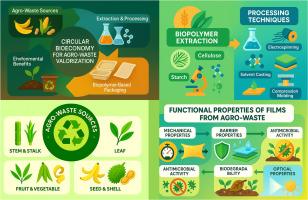Valorization of plant-based agro-waste into sustainable food packaging materials: Current approaches and functional applications
引用次数: 0
Abstract
There is an increasing demand for sustainable food packaging solutions, leading to the valorization of plant-based agro-waste into biodegradable, flexible, and functional materials. This review comprehensively covers state-of-the-art methods and advances for converting agro-industrial waste into high-performance packaging materials, focusing on biopolymers such as cellulose, hemicellulose, starch, pectin, lignin, chitosan, alginate, and polyhydroxyalkanoates (PHAs). They are characterized by favorable mechanical, barrier, bioactive, and degradation properties, aligning with circular bioeconomy principles by reducing dependence on fossil-based plastics and minimizing waste. These agro-waste-derived materials ensure food safety, extend shelf life, and enable active and intelligent packaging through bioactive compound incorporation, improving antimicrobial and antioxidant properties while reducing environmental burdens. This review spotlights advanced processing and fabrication techniques, including solvent casting, melt extrusion, electrospinning, compression molding, and layer-by-layer assembly, while addressing key technological, economic, and regulatory barriers to scalability. Additionally, the review explores the valorization of diverse plant-based wastes (stem, leaf, fruit and vegetable, seed and shell, root and tuber) for biopolymer extraction, contributing to the development of biodegradable packaging solutions that reduce carbon footprints and environmental pollution. The implementation of these innovative agro-waste-based packaging materials supports global sustainability and SDGs, providing a pathway towards a resilient, circular food system.

植物性农业废弃物转化为可持续食品包装材料:目前的方法和功能应用
对可持续食品包装解决方案的需求不断增加,导致以植物为基础的农业废弃物转化为可生物降解的、柔性的和功能性的材料。本文综述了将农业工业废弃物转化为高性能包装材料的最新方法和进展,重点介绍了纤维素、半纤维素、淀粉、果胶、木质素、壳聚糖、海藻酸盐和聚羟基烷酸盐等生物聚合物。它们具有良好的机械、屏障、生物活性和降解性能,通过减少对化石塑料的依赖和最大限度地减少浪费,符合循环生物经济原则。这些源自农业废弃物的材料确保了食品安全,延长了保质期,并通过加入生物活性化合物实现了活性和智能包装,提高了抗菌和抗氧化性能,同时减少了环境负担。本文重点介绍了先进的加工和制造技术,包括溶剂铸造、熔融挤压、静电纺丝、压缩成型和逐层组装,同时解决了可扩展性的关键技术、经济和监管障碍。此外,本文还探讨了多种植物基废物(茎、叶、水果和蔬菜、种子和壳、根和块茎)用于生物聚合物提取的价值,有助于开发可生物降解的包装解决方案,减少碳足迹和环境污染。这些基于农业废弃物的创新包装材料的实施支持全球可持续性和可持续发展目标,为实现有弹性的循环粮食系统提供了一条途径。
本文章由计算机程序翻译,如有差异,请以英文原文为准。
求助全文
约1分钟内获得全文
求助全文

 求助内容:
求助内容: 应助结果提醒方式:
应助结果提醒方式:


